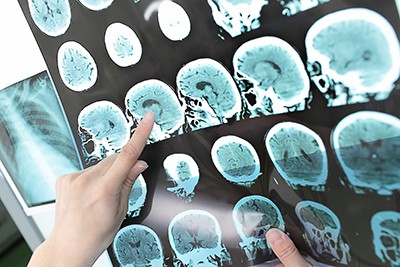 Many symptoms of Post-traumatic Stress Disorder (PTSD) and Traumatic Brain Injury (TBI) are similar. Yet, effectively treating the two conditions must be done very differently. A new study, published in PLOS One, has discovered a method of distinguishing between PTSD and TBI using brain scans.
Many symptoms of Post-traumatic Stress Disorder (PTSD) and Traumatic Brain Injury (TBI) are similar. Yet, effectively treating the two conditions must be done very differently. A new study, published in PLOS One, has discovered a method of distinguishing between PTSD and TBI using brain scans.
Study participants’ brains were each scanned using single-photon emission computer tomography (SPECT). This technique measures the flow of blood to highly specific parts of the brain. The study examined more than 20,000 individuals with PTSD, TBI, both conditions, or neither condition. One hundred of each patient type were rigorously controlled for demographics and co-occurring conditions.
The researchers determined that while the symptoms of PTSD and TBI can be very similar, in a brain scan, the two conditions look nothing alike.
PTSD patients demonstrate heightened activity in the limbic system, basal ganglia, pre-fontal cortex, cerebellum, and temporal, occipital, and parietal lobes. Also affected were those areas of the brain that are integral in fear processing, sensory processing, emotional regulation, and integration of information.
Those suffering from TBI showed reduced activity in the pre-fontal cortex, temporal lobes, and cerebellum. Coordinated movement, self-control of mood and behavior, and memory formation are governed by these parts of the brain.
Further Reading: Hit-and-Run Attributed to Previous Brain Injury
Scans read visually by humans result in 89 percent accuracy, and, in the larger group, computer analysis could only achieve 82 percent accuracy. However, in the smaller controlled groups, with the aid of computer-driven analysis, researchers were able to determine with 100 percent accuracy, which patients were suffering from PTSD or TBI.
The overlapping symptoms of PTSD and TBI cause added difficulty because diagnosis and corresponding treatment of the conditions is determined by symptom clusters. Being able to accurately differentiate between the two conditions through the use of functional neuroimaging with SPECT removes the hurdles to accurately diagnosing and effectively treating them.
Accurate diagnosis is important to car accident victims who are experiencing insomnia, headaches, and difficulty concentrating and remembering. Do they have PTSD or a TBI? Knowing the difference is vital to treating their injuries. After all, therapies for one condition could exacerbate the other. This vital information will allow doctors to customize the best treatment plan for car accident victims and help restore their quality of life.
Contact Our Experienced Broomfield Personal Injury Lawyers
 If you or someone you love has been injured in a car accident in Broomfield, Northglenn, Westminster, Thornton, or anywhere in Colorado, it is important to contact our Northglenn personal injury attorneys immediately. At Hull & Zimmerman, P.C., our committed personal injury lawyers are dedicated to the belief that everyone deserves justice. Contact us at (303) 423-1770 or (866) 385-3505.
If you or someone you love has been injured in a car accident in Broomfield, Northglenn, Westminster, Thornton, or anywhere in Colorado, it is important to contact our Northglenn personal injury attorneys immediately. At Hull & Zimmerman, P.C., our committed personal injury lawyers are dedicated to the belief that everyone deserves justice. Contact us at (303) 423-1770 or (866) 385-3505.
Our personal injury lawyers have extensive experience representing injured accident victims in Broomfield, Arvada, Superior, Lafayette, Louisville, Erie, Brighton, Commerce City, Northglenn, Westminster, Thornton, Longmont, and throughout Colorado.

